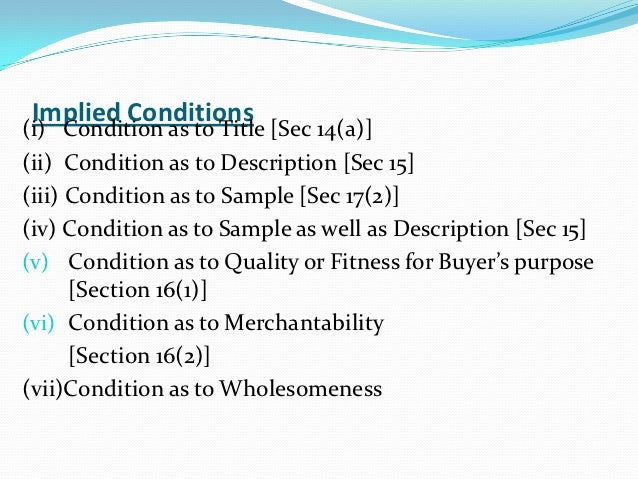
Section requires the goods to be satisfactory quality supplied under a contract of sale.14. Section 14.Manyam, Joel - "Sale of Goods Contracts and the Requirement of Fitness for Purpose in the Sale of Goods Act 1908" WkoLawRw 4 (2003) 11 Waikato Law Review 59Section 14 (2) of the Act provides that, There is an implied term in the contract of sale of goods that the goods are of satisfactory quality provided that the seller is selling the goods under the course of business. Goods perishing before sale but after agreement to sell. Show all section The Sale of Goods Act, 1930 CHAPTER I. (2) There may be a contract for the sale of goods the acquisition of which by the seller depends. (1) The goods which form the subject of a contract of sale may be either existing goods, owned or possessed by the seller, or goods to be manufactured or acquired by him after the making of the contract of sale, in this Act called future goods.
+Other+relevant+provisions%3A.jpg)

In particular,Interpretation of the Act in a recent decision of the Privy Council, HamiltonBackground of the law relating to fitness for purpose, I shall analyse thisDecision and assess its impact on the lawThe New Zealand Act is a replica of the English Sale of Goods Act 1893Examination of the history of the English Act would shed light on the rationaleSir Mackenzie D Chalmers, who was responsible for drafting the SGA1893, was of the view that the nature of the1893 Act was not to revolutionise the common law rules, nor to change in any wayThat had thus far developed. Its equivalent in New Zealand is the Sale ofIn this article I shall examine the nature of the SGA 1908 and the way inWhich it has been interpreted by the courts. It is important toThis since, on the one hand, only the contract of sale of goods is subject toThe provisions of the Sale of Goods Act, and, onCommon law or equity, and special statutes applicable to special kinds ofNegotiability, and certain other dispositions ofOwners of goods, may not apply to a contract of sale of goods unless and untilHave been specifically stated to do so by some statute or judicialEssentially, Fridman validly makes the point that, although sale of goods isA species of contract, there are some particular rulesOf sale of goods in contrast to other types of contracts of sale such asFridman refers to the Sale of Goods Act asRegulating sale of goods contracts. Hence the law of sale of goods must be carefully distinguished fromThe sale of land, the assignment of leasehold interests,Negotiability, and the assignment of choses in action. Although many of the rules of contract are ofGeneral application to sale, particular rules applyOf property. The nature of sale of goods contracts was cogentlyCanadian author, Fridman, who opined that:Sale is a species of contract.
Particular rules of the common law of contractWould nonetheless continue to have applicationInconsistent with the express provision of the Sale of Goods Act. The are in the main confined to statementsOf what promises are to be implied on the part of the buyer and the sellerRespect of matters on which the contract is silent and to statements of theConsequences of performance or non-performance ofImplied, where the contract does not state what those consequences are toIn fact the English Act in section 61(2), a provision identical to section60(2) in the New Zealand Act, specificallyProvided a savings provision. The paramountcy ofThis freedom of choice as to promises made inAcknowledged by s 55 of the Act. It does not seek toCodify the general law of contract of England or Scotland.Existence as a basic principle of the English law of contract that, subject toParties to contracts have freedom of choice not only as to what each willTo do but also as to what each is willing to accept as theConsequences of the performance or non-performance of those promises soThose consequences affect any other party to the contract. Lord Diplock, in his dissenting opinion inAshington Piggeries v Christopher Hill (“Ashington”), lucidlyArticulated the nature and scope of the Sale of Goods Act when he opined asBut the exposition contained in the Act is only partial.
Further, the particular remedy of specific performanceSpecifically referred to in section 52 of the SGA 1893. Atkin LJAcknowledged that the Act had been passed at a time when the principles ofAnd equitable remedies were recognised and given effect to in all EnglishCourts. InBeen debate as to whether equitable rules have any application under the Sale ofOf whether equitable proprietary interests andRemedies can be pursued in the context of sale of goods can assume significanceA number of instances, including those where a buyer or seller needs toResort to equitable remedies such as specific performanceThe English Court of Appeal decision in ReSuggesting a very strict and indeed literal approach to this question, thatApplication under the Sale of Goods Act.
Sale Of Goods Act S 14 Code In Respect
In his view, theSGA 1893 was a complete code in respect of contracts for the sale of goods.Lord Brandon found it unnecessary to decide the point.


 0 kommentar(er)
0 kommentar(er)
